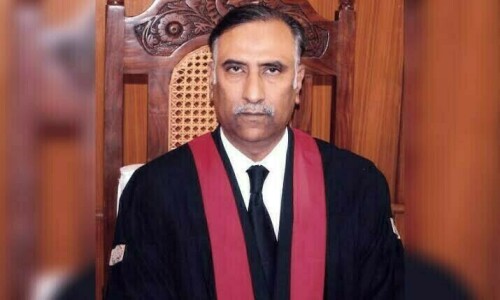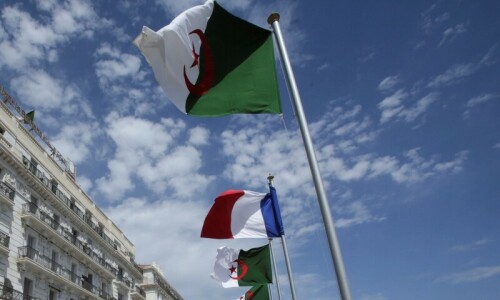ISLAMABAD: Affirming the returns given to power projects under the China-Pakistan Economic Corridor (CPEC) are on the higher side, Planning and Development Minister Asad Umar on Wednesday said details of all Chinese loans had been shared with the International Monetary Fund (IMF) and these were more economical than all other loans, including those obtained from multilateral and other western lenders.
The “returns on equity (RoE) for these projects were higher which should not have been”, but these returns were available to all investors, including the US investors, and there was nothing China-specific, Mr Umar said while speaking at a news conference with Special Assistant to the Prime Minister (SAPM) on CPEC Affairs Khalid Mansoor.
Mr Mansoor said partial payments out of $1.4 billion dues to Chinese power companies would be made in a week. He said he had submitted a formal petition to the National Electric Power Regulatory Authority (Nepra) which held a proper hearing on the issue.
Although Nepra did not reduce return on equity, it changed the sub-critical technology for Thar coal projects. “They should not have given such returns on equity,” he said but added that this did not mean such returns were because of China as “these were also available to Americans as well”.
Responding to a question, the planning minister said there was nothing bad about Chinese investments and loans that one might tend to hide and the government had made all those details public many a times. “The IMF had also sought details about CPEC loans which we had provided and no more questions were raised,” added.
Mr Umar said there had been unjustified international campaign against CPEC but for Pakistani media to follow that narrative was totally nonsense because Chinese loans, including those under CPEC, were cheaper than those of multilaterals and other western lenders. He said Chinese loans stood at 10 per cent of total local and external loans Pakistan had and 26pc of total external debt and liabilities.
Therefore, he added, suggestion that relatively expensive 74pc loans from the multilaterals and western lenders were not a threat to Pakistan and 26pc cheaper loans from China were a threat was illogical. “Pakistan has a debt problem but it does not have a China debt problem. Pakistan also has debt sustainability issue but it was not due to Chinese loans,” he added.
The minister explained that CPEC had two types of loans — private loans to power sector projects and infrastructure loans on a government-to-government basis. He said private loans to power projects under CPEC contained Libor plus 3.3pc to 4.7pc interest and averaged Libor plus 4pc against 4.25pc average financing cost of loans form the World Bank’s International Finance Corporation, Asian Development Bank, Germany and other western lenders.
Likewise, CPEC loans to government for infrastructure projects ranged between 2pc and 5.2pc and averaged 2.38pc interest. Besides, China has also provided grants to many projects, including Gwadar airport and, if all government-to-government loans are taken into account, the average cost is no more than an average of 1.98pc. On top of that, these loans have a 20-year maturity period and another five-year grace period which is very attractive rate for project financing.
Khalid Mansoor said even the US authorities conceded that such loans normally required a condition to have equipment on the buyer’s credit from the lender, but the Chinese were so flexible that turbines, boilers and so on for Thar and Hub coal projects had been procured from General Electric, USA.
Responding to a question, the SAPM said Chinese power companies were coming to him on a daily basis and showing unprecedented patience pertaining to payment of over Rs230bn ($1.4bn) dues which had built up because of internal indecision whether these payments had to flow from collection of tariff or government subsidy. He said the relevant ministries had promised that some payments would be made within this week.
Asad Umar said the authorities concerned were bound to provide the required information to parliament and its committees. Besides, he added, all the information about tariff structure of energy projects under CPEC was also available on Nepra website.
The minister said the conditions offered by Pakistan to install power plants were not only for China but also for all countries, adding that only China responded to the conditions. The US companies invested in power plants in the 1990s and this time, investments came from China, he said.
SAPM Mansoor said that when work on the Thar coal power project was initiated, no one other than China was ready to invest in the project.
In reply to a question, Asad Umar said Pakistan wanted the world to develop economic relations with Afghanistan by supporting the country in its development process unlike the past when they left the country in the wilderness and then had to invest trillions of dollars to stabilise it. They should not repeat the same mistake, he added.
Published in Dawn, October 7th, 2021











































